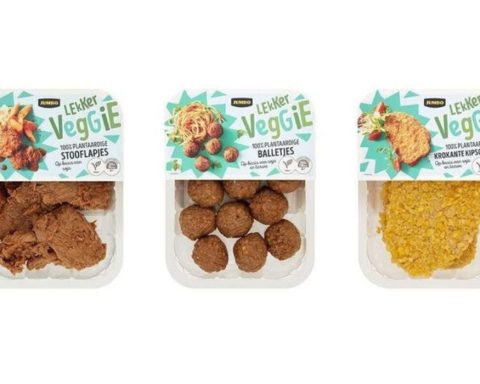When Chris Bryson sees a problem, he has a lot of trouble looking away.
In the early days of the pandemic, when pet adoptions were on the rise, he started fostering a cat. That cat quickly became two cats, and then he added another two cats. Eventually, he was fostering eight cats in his apartment.
“And then I thought, ‘Wow, I can’t keep doubling this or this is going to be a problem. But how do I help more?’” says Bryson, who founded Unata, a software platform that connects grocers and consumers and was acquired by Instacart in 2018. “I think I just have this addiction to wanting to scale up and do more and try to have a larger impact than what I did yesterday.”
That need to do more led him to launch Toronto-based New School Foods – an alternative seafood start-up that’s looking to offer whole plant-based fillets of salmon. The potential for alternative seafood is huge, as scientists say that wild-catch and aquaculture won’t be able to meet the world’s growing appetite for seafood. Global demand for fish products is expected to grow by 14% by 2030 compared to 2020 levels, while the United Nations says that 90% of fish stocks are being harvested at unsustainable levels or are maxed out. Wild salmon stocks alone are on the verge of collapse in the United Kingdom, British Columbia and California, and fish farms are rife with antibiotics and disease.
Bryson’s company, which plans to launch its product in restaurants this summer, is a smallish fish in a growing pond. Alternative seafood – which includes fish and mollusks that are plant-based, lab-grown and fermented – is a nascent industry that could make up a significant chunk of future seafood demand. But key for these start-ups will be avoiding some of the pitfalls experienced by plant-based meat companies in recent years. Since the original hype around their launch, plant-based burger companies like Beyond Meat and Impossible Foods have seen their stocks plummet and sales plateau. And the (plant-based) bleeding hasn’t really stopped, as last year unit sales dropped 8%.
Alternative seafood gets us beyond the burger and the nugget – and into future food 2.0.
– Marissa Bronfman, founder and executive director of Future Ocean Foods
Bryson and other innovators are cautiously optimistic that things will be different for them and that it’s only a matter of time before a tidal wave of plant-based seafood washes up on our shores.
“Alternative seafood gets us beyond the burger and the nugget – and into future food 2.0,” says vegan impact investor Marissa Bronfman, the founder and executive director of Future Ocean Foods, an alternative seafood association launched last fall and headquartered in Halifax, Nova Scotia, with, to date, 36 companies in 14 countries. “It also gets us outside of North America. More than three billion people around the world look to seafood as their primary protein source. The potential is enormous.”
A plant-based pioneer goes fishy
New innovators are entering the alternative fish space, but it’s also attracting familiar faces from the plant-based protein world. In 2020, Yves Potvin, of Yves Veggie Cuisine fame, started a Richmond, B.C.–based alternative seafood venture called Konscious Foods that makes plant-based sushi and poke bowls. Konscious Foods closed a $26-million seed funding round last year, attracting investments from Protein Industries Canada (an industry-led not-for-profit that invests in Canadian plant-protein start-ups) and now has products in the freezer aisles of 4,500 retailers across North America, including Whole Foods.
Potvin has said that to grow and scale, plant-based products must be nutritious, affordable, convenient and taste good. With Konscious Foods, he’s managed to figure out how he can make a decent product and keep the price comparable to traditional sushi. “One of the biggest challenges in [the] plant-based [industry] is that the products are often 20 to 50% more expensive, so not only do consumers have to sacrifice on taste and the texture, they have to spend more money,” Potvin told AgFunderNews. “We are the first in the marketplace at the same price [as conventional seafood products]. So we’re ticking all the right boxes.”

The taste–price equation
Surveys show that taste and price have been big barriers to selling consumers on plant-based products. While the taste of these products has come a long way in recent years, burgers from companies like Beyond Meat and Impossible Foods are still far more expensive than beef burgers. Observers say it’s only a matter of time before these prices come down as more people buy the products, but investors are growing anxious.
Plant-based seafood might have an advantage on its price point over the alternative meats as fish typically is more expensive than many meats. A number of the start-ups in this area are also making products that mimic higher-quality cuts and types of fish and seafood. “How do we compete on price? We compete on price by going after these ultra-premium fish and cuts and looking to see if we can get there first before extending the technology down further along the price curve,” says Casey Silver, a senior analyst at McKinsey & Company who co-authored a recent report that outlined some of alternative seafood’s challenges and advantages.
Some observers question whether this focus on high-end cuts, however, may pose problems for the scalability of the industry and its ability to fill the growing demand for cheaper seafood in the broader market. But Silver says this is simply a way to prove the technology before moving on to other cuts and types of fish. “This is a way to get everything as far down that price curve as we can before needing to go up against the tilapias and white fishes, which isn’t to say other companies aren’t doing that, because they are.”

Alternative seafood also has a much wider range of products it can emulate than the land animals that are typically farmed. This is both an opportunity and a challenge, as an alternative for each individual type of seafood with its own taste profile will need to be carefully crafted and fine-tuned so that consumers accept it.
New School Foods’ alternative salmon fillet, which was developed in partnership with researchers at Toronto Metropolitan University, will make its debut at restaurants before hitting the retail market. Bryson says he wants to win over chefs before consumers. “I think we need to earn the . . . respect of chefs before we can convince people we are worthy of being on their dinner plate,” he says.
But is it healthy?
While studies have shown that plant-based burgers are healthier than beef burgers, some consumers have been scared away by the long ingredient lists on their labels and the idea that plant-based prepared foods are “ultra-processed.” Advocates concede that, no, plant-based burgers are not health products, but they are, for the most part, healthier than meat.
Bryson says the salmon fillet product that New School Foods is making will be inherently healthier than a traditional piece of salmon because of the mercury, microplastics and other contaminants present in real fish. New School Foods also plans to include some of the nutritional benefits, such as omega-3 fats, that are in real salmon.
Swimming upstream
Investments in the alternative seafood sector grew 92% from 2021 to 2022, according to Future Ocean Foods. Retail sales have grown steadily in North America, and some big food companies, such as Cargill and Nestlé, have dipped their toes into the space. Despite the growth, investors have been cautious about putting their money into the alternative seafood space after what happened with plant-based meat. But there is optimism that it’s only a matter of time before alternative proteins flourish. From 2021 to 2022, alternative seafood saw a 42% growth in retail sales in the United States.
It remains to be seen whether the alternative seafood sector, and the broader plant-based protein industry, will come to dominate the market. But if the world is going to feed 10 billion people by 2050, and do so sustainably, there might be no other option.
“This is a huge task, requiring enormous amounts of public and private capital,” Bronfman says. “We have brilliant people all over the world creating meaningful solutions to problems, but they need more support.”
Alex Robinson is deputy editor at Corporate Knights.
Check back here as we roll out our Plant Power package this week, along with the release of the 2024 Spring issue of Corporate Knights.







